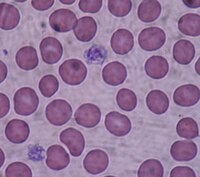
Photo from wikipedia
Increased blood platelet activation, especially platelet aggregation, plays an important function in cardiovascular disease; however, various dietary components may inhibit platelet activation. Recent clinical and epidemiologic studies indicate that both… Click to show full abstract
Increased blood platelet activation, especially platelet aggregation, plays an important function in cardiovascular disease; however, various dietary components may inhibit platelet activation. Recent clinical and epidemiologic studies indicate that both fruits and vegetables, and their products, contain various phytoprotective substances possessing biological properties such as antiplatelet and antioxidant effects that may work synergistically to ameliorate the effect of cardiovascular disease. In addition, the consumption of vegetables and their products may also play an important role in prevention. However, the mechanisms involved have not been clearly defined. Various studies clearly indicate that certain vegetables (e.g., onions, garlic, and tomatoes) have beneficial effects on blood platelet hyperactivity, an important cardiovascular risk factor, and hence may offer new prophylactic and therapeutic possibilities for the treatment of blood platelet hyperactivation and cardiovascular disease. This mini-review evaluates the current literature on the relationship between the consumption of onion (Allium cepa L.), garlic (Allium sativum L.), tomato (Solanum lycopersicum L.), and beetroot (Beta vulgaris L.), and blood platelet activation, which may have important implications for the prophylaxis and treatment of cardiovascular disease.
Journal Title: Advances in nutrition
Year Published: 2019
Link to full text (if available)
Share on Social Media: Sign Up to like & get
recommendations!